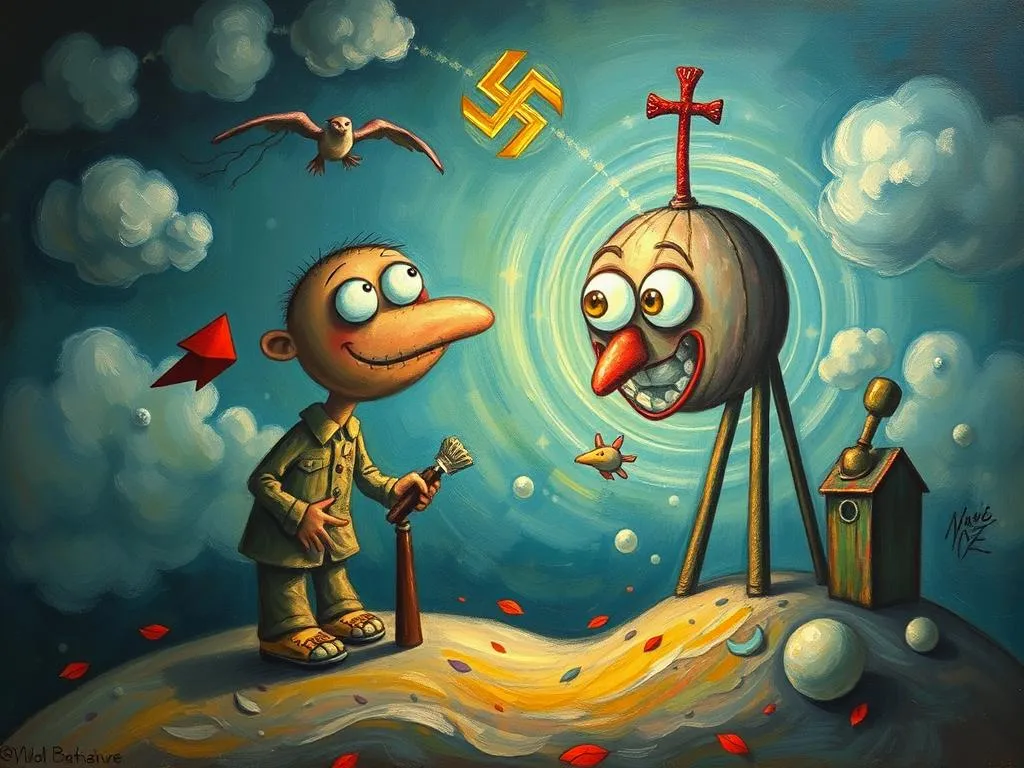
Dreams can often feel like a tangled web of emotions and experiences, reflecting both our deepest fears and our unacknowledged desires. Among the many symbols that may emerge in our dreams, few evoke as strong a reaction as those related to Nazism. The appearance of Nazi imagery in dreams can be deeply unsettling, stirring feelings of dread, anger, or confusion. However, understanding the symbolism behind these dreams can lead to profound insights about our psyche and societal context.
As we navigate through the nuances of these dreams, remember that they often act as mirrors, reflecting our internal struggles, cultural fears, and personal conflicts. So, let’s embark on this journey together, peeling back the layers of meaning, exploring personal experiences, and ultimately fostering growth through our understanding of these powerful symbols.
Shadows of the Past: Unpacking the Symbolism
When we dream of Nazis or Nazi imagery, it’s essential to first recognize the cultural weight these symbols carry. Historically, Nazism represents oppression, hatred, and the horrors of genocide. The presence of such imagery in our dreams can often symbolize internal conflicts with authority, control, or even unresolved trauma.
-
Authority and Control: The figure of a Nazi can embody the idea of oppressive authority. If you find yourself dreaming of Nazis, it may reflect your feelings about an authoritarian figure in your life—perhaps a boss, parent, or societal structure. This can be a call to examine how these dynamics affect you.
-
Fear of Oppression: In a broader sense, dreaming of Nazis can tap into our collective fears of oppression and tyranny. This might resonate particularly if you are feeling marginalized or powerless in your waking life. Your unconscious might be processing these fears, manifesting them in a nightmare.
-
Guilt and Shame: For some, these dreams can evoke feelings of guilt or shame, perhaps related to their own beliefs or actions. This might be especially true if you have recently grappled with issues of race, discrimination, or historical injustices. The dream serves as a reminder to confront these feelings rather than repress them.
-
Repressed Anger: The Nazi symbol can also represent repressed anger or frustration. If you feel that your voice is silenced or your needs unmet, your dreams may reflect this internal rage. The imagery pushes you to confront these emotions rather than suppress them.
-
Historical Reflection: Finally, dreaming of Nazis may be an invitation to reflect on historical events. If you are studying or have recently encountered discussions about WWII or social justice, your brain may be processing these heavy themes through dreams.
By delving into these symbolic meanings, we can uncover layers of understanding that might not be immediately apparent. Allow yourself to explore these interpretations as they relate to your unique circumstances.
Nightmares of the Past: Personal Experiences
To understand how the symbolism manifests in dreams, let’s explore a few scenarios that might resonate with you or someone you know.
-
The Marching Soldiers: Imagine a dream where you witness a row of soldiers marching in unison, accompanied by ominous music. This dream might symbolize your feelings of being trapped in a routine or conforming to societal expectations. The soldiers represent the pressure to fit in, while the eerie atmosphere highlights your discomfort with conformity.
-
A Confrontation: Picture a dream where you find yourself face-to-face with a Nazi officer. This confrontation could represent an internal struggle with a controlling figure in your life. The officer’s presence embodies your fears of losing autonomy, challenging you to reclaim your power and assert your boundaries.
-
Historical Displacement: In another scenario, you might dream of witnessing atrocities from the past, perhaps in a surreal, fragmented narrative. This type of dream might be your mind’s way of processing historical trauma—either personal or collective. It invites you to acknowledge the impact of history on your current life, urging you to engage with these themes more consciously.
-
Silent Witness: Imagine dreaming that you are a bystander in a scene of persecution, unable to intervene. This dream could reflect feelings of helplessness in the face of injustice in your waking life. It’s a call to action, encouraging you to find your voice and stand up for those who may be marginalized or oppressed.
-
The Shadow Self: Lastly, consider a dream where you see a reflection of yourself in a Nazi uniform, filled with confusion and horror. This might be a powerful representation of your shadow self—the parts of you that you reject or deny. It urges you to confront these aspects, fostering a sense of wholeness and acceptance.
In each of these scenarios, the Nazi imagery serves as a catalyst for deeper introspection. Rather than shying away from the discomfort, leaning into these experiences can unlock valuable insights about your emotional landscape and societal context.
Rising from the Ashes: Embracing Personal Growth
As we continue to explore the implications of these dreams, it’s important to recognize that they can also serve as pathways for personal growth. Here are some practical steps you can take to harness the insights gained from these unsettling dreams.
-
Journaling: Keeping a dream journal can be an invaluable tool. Write down your dreams as soon as you wake up, noting any feelings or thoughts that arise. Over time, patterns may emerge that can guide your understanding of your subconscious.
-
Engage with History: If your dreams are steeped in historical imagery, consider reading or researching the events surrounding Nazism. Understanding the historical context can help you process these dreams more effectively and may even alleviate some fears associated with them.
-
Therapeutic Dialogue: Speaking with a therapist or counselor about your dreams can lead to deeper insights. They can help facilitate a dialogue about your feelings, fears, and the symbolism present in your dreams, offering strategies for coping and processing.
-
Artistic Expression: Channel the emotions stirred by your dreams into creative outlets. Whether through painting, writing, or music, expressing these feelings can lead to healing and self-discovery. It’s a way to externalize and make sense of the internal chaos.
-
Mindfulness Practices: Engaging in mindfulness or meditation can help you ground yourself as you navigate the emotional landscape of your dreams. Developing a practice of self-awareness can empower you to confront fears and recognize patterns in your thoughts and behaviors.
Ultimately, dreams featuring Nazi imagery remind us that our subconscious is a complex tapestry of thoughts, emotions, and experiences. By engaging with these symbols and the messages they carry, we can foster a deeper understanding of ourselves and the world around us.
Reflection: As you process the significance of dreams involving such heavy symbols, remember that they are not merely reflections of fear or trauma but powerful invitations for growth and understanding. Embrace the discomfort and allow it to guide you toward greater self-awareness and empowerment. In confronting the shadows, we often find the light of resilience and hope.







